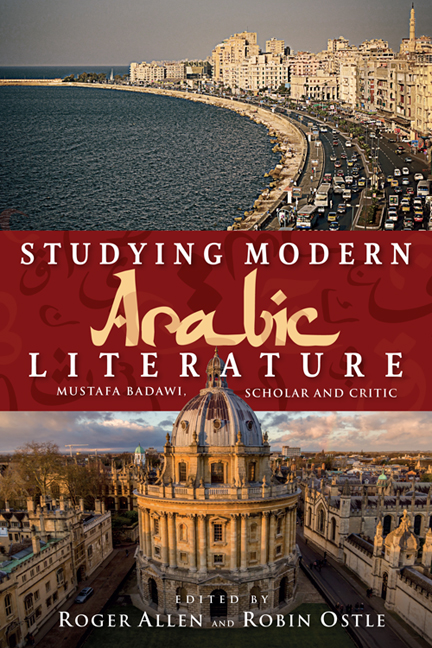Book contents
- Frontmatter
- Contents
- List of Figures
- Introduction
- Part I Alexandria to Oxford
- 1 The Cosmopolitan Alexandrian
- 2 Muhammad Mustafa Badawi in Conversation
- 3 Badawi: An Academic with a Vision. A Personal Testimony
- 4 From the Shadow Plays of Ibn Daniyal to the Poetry of Philip Larkin: Mustafa Badawi as Editor and Translator
- Part II The Academic Legacy
- Notes on the Contributors
- Index
4 - From the Shadow Plays of Ibn Daniyal to the Poetry of Philip Larkin: Mustafa Badawi as Editor and Translator
from Part I - Alexandria to Oxford
Published online by Cambridge University Press: 05 August 2016
- Frontmatter
- Contents
- List of Figures
- Introduction
- Part I Alexandria to Oxford
- 1 The Cosmopolitan Alexandrian
- 2 Muhammad Mustafa Badawi in Conversation
- 3 Badawi: An Academic with a Vision. A Personal Testimony
- 4 From the Shadow Plays of Ibn Daniyal to the Poetry of Philip Larkin: Mustafa Badawi as Editor and Translator
- Part II The Academic Legacy
- Notes on the Contributors
- Index
Summary
This perhaps unusual title defines in a way the range of literature in which Mustafa Badawi was interested and refers in particular to two works with which he was connected. Both demonstrate his deep concern with and interest in language and with making works of literature available to the Arabic reading public. He was more concerned with the intrinsic value of each work he dealt with in the great range of world literature than with any wider popularity his own work might have. It was his calling to educate, enlighten and enhance the intellectual lives of any who might read his publications. He could not imagine a life without time for literature in all its forms. Coming from an Arabic-speaking background and living and working in an English one, he assumed the specific task of bringing to the notice of his Arabic readers examples both of their own literature that he felt to be unjustly neglected and through translation examples of English works largely unknown to that same audience in the original language – all this in addition to his comprehensive writings in English on the history of Arabic literature for an English-reading public. (It is significant that one of these works – Early Arabic Drama – appeared in 2013 in an Arabic translation, happily proving that a text published in 1988 in English was thought to be useful too in Arabic.)
Of the two authors mentioned in the title of this article, at one extreme there is a thirteenth-century Arabic poetic/dramatic text, at the other a translation of a modern English poet. I do not imagine that either work has attracted a very large readership but they were both produced in the greater cause of promoting literature.
Badawi and Ibn Daniyal
The story of the publication of the shadow plays of Ibn Daniyal (1248–1310) is a long and curious one. They were first noticed in Europe by the German orientalist Georg Jacob (1862–1937). He wrote about them in his Geschichte des Schattentheaters im Morgen- und Abendlande (1925). Jacob's friend and colleague Paul Ernst Kahle (1875–1964) developed a fascination for the texts of the plays and spent many long hours and years in editing them.
- Type
- Chapter
- Information
- Studying Modern Arabic LiteratureMustafa Badawi, Scholar and Critic, pp. 55 - 66Publisher: Edinburgh University PressPrint publication year: 2015

